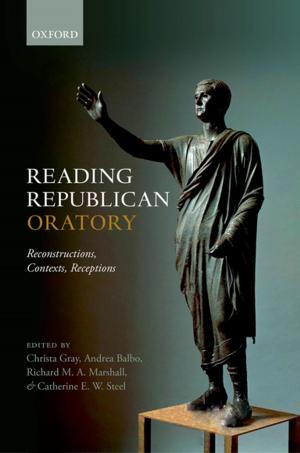A World History of Ancient Political Thought
Its Significance and Consequences
Nonfiction, Social & Cultural Studies, Political Science, Government, Social Policy, Religion & Spirituality, Philosophy| Author: | Antony Black | ISBN: | 9780192507990 |
| Publisher: | OUP Oxford | Publication: | October 20, 2016 |
| Imprint: | OUP Oxford | Language: | English |
| Author: | Antony Black |
| ISBN: | 9780192507990 |
| Publisher: | OUP Oxford |
| Publication: | October 20, 2016 |
| Imprint: | OUP Oxford |
| Language: | English |
This revised and expanded edition of A World History of Ancient Political Thought examines the political thought of ancient Egypt, Mesopotamia, Israel, Iran, India, China, Greece, Rome and early Christianity, from prehistory to c.300 CE. The book explores the earliest texts of literate societies, beginning with the first written records of political thought in Egypt and Mesopotamia and ending with the collapse of the Han dynasty and the Western Roman Empire. In most cultures, sacred monarchy was the norm, but this ranged from absolute to conditional authority. 'The people' were recipients of royal (and divine) beneficence. Justice, the rule of law and meritocracy were generally regarded as fundamental. In Greece and Rome, democracy and liberty were born, while in Israel the polity was based on covenant and the law. Confucius taught humaneness, Mozi and Christianity taught universal love; Kautilya and the Chinese 'Legalists' believed in realpolitik and an authoritarian state. The conflict between might and right was resolved in many different ways. Chinese, Greek and Indian thinkers reflected on the origin and purposes of the state. Status and class were embedded in Indian and Chinese thought, the nation in Israelite thought. The Stoics and Cicero, on the other hand, saw humanity as a single unit. Political philosophy, using logic, evidence and dialectic, was invented in China and Greece, statecraft in China and India, political science in Greece. Plato and Aristotle, followed by Polybius and Cicero, started 'western' political philosophy. This book covers political philosophy, religious ideology, constitutional theory, social ethics, official and popular political culture.
This revised and expanded edition of A World History of Ancient Political Thought examines the political thought of ancient Egypt, Mesopotamia, Israel, Iran, India, China, Greece, Rome and early Christianity, from prehistory to c.300 CE. The book explores the earliest texts of literate societies, beginning with the first written records of political thought in Egypt and Mesopotamia and ending with the collapse of the Han dynasty and the Western Roman Empire. In most cultures, sacred monarchy was the norm, but this ranged from absolute to conditional authority. 'The people' were recipients of royal (and divine) beneficence. Justice, the rule of law and meritocracy were generally regarded as fundamental. In Greece and Rome, democracy and liberty were born, while in Israel the polity was based on covenant and the law. Confucius taught humaneness, Mozi and Christianity taught universal love; Kautilya and the Chinese 'Legalists' believed in realpolitik and an authoritarian state. The conflict between might and right was resolved in many different ways. Chinese, Greek and Indian thinkers reflected on the origin and purposes of the state. Status and class were embedded in Indian and Chinese thought, the nation in Israelite thought. The Stoics and Cicero, on the other hand, saw humanity as a single unit. Political philosophy, using logic, evidence and dialectic, was invented in China and Greece, statecraft in China and India, political science in Greece. Plato and Aristotle, followed by Polybius and Cicero, started 'western' political philosophy. This book covers political philosophy, religious ideology, constitutional theory, social ethics, official and popular political culture.















